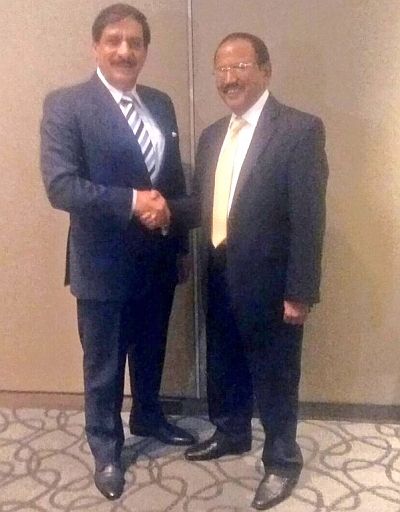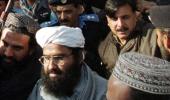 Considering the huge stakes, the Modi government is not averse to make more diplomatic efforts to see whatever it can salvage, says Rajeev Sharma.
Considering the huge stakes, the Modi government is not averse to make more diplomatic efforts to see whatever it can salvage, says Rajeev Sharma.
The Narendra Modi government is still not ready to throw in the towel on its peace initiative with Pakistan.
Expect a two-pronged new initiative in the coming weeks, both having National Security Advisor Ajit Doval in the driver's seat.
One relates to Doval's coming visit to China for a strategic dialogue where Pakistan will inevitably be the elephant in the room.
The second one is even more ambitious -- another meeting of Doval with his Pakistani counterpart Lieutenant General Nasir Janjua (retd) in a third country where the two countries' foreign secretaries are also likely to be present.
The first such meeting in Bangkok last December triggered pro-active bilateral engagement between the two nuclear armed neighbours.
However, things have taken a downhill course steadily since the Pathankot terror attack and reached a flashpoint with Pakistani High Commissioner Abdul Basit announcing last week that the India-Pakistan peace process is 'suspended.'
Pakistan Prime Minister Nawaz Sharif called Narendra Modi on Sunday, ostensibly to express his grief over the Kerala temple tragedy. However, it will be foolhardy to believe that the two prime ministers did not discuss or Modi did not raise the issue of Basit's provocative remarks, particularly when Doval has already spoken to his Pakistani counterpart and complained against Basit's unexpected outburst.
As per the established diplomatic protocol, when a head of government calls up another head of government, the recipient's office is told about it in advance and asked about the convenient time for receiving the call. This gives ample time to the receiving nation's leadership to consult among themselves and prepare for the telephone call.
Inevitably, Modi would have consulted his aides and Cabinet colleagues and prepared well to receive Sharif's call.
Doval's visit to China won't be limited to just China's recent blocking of Indian efforts in the United Nations seeking a ban on Pakistan terrorist Masood Azhar.
The NSA's effort will be to break the China Wall around Azhar. India has already stepped up its engagement with Pakistan's traditional best friends in the Muslim world -- Saudi Arabia and the United Arab Emirates -- causing ripples in Pakistan's diplomatic establishment. This may be difficult, but definitely not impossible.
The likely Indian strategy would be to tell China that New Delhi is not trying to drive a wedge between China and Pakistan, but only trying to sensitise China about the perils of the Chinese policy in going soft on the terror infrastructure thriving in Pakistan as it would impact adversely on China's own security in view of the large restive Uighur population in Xinjiang province.
Two things will be of utmost importance for the survival of Modi's Pakistan peace initiative which is currently hanging by thin thread. Both will impact Modi and the Bharatiya Janata Party in a big way.
1. What kind of report will be submitted by Pakistan's Joint Intelligence Committee which recently visited the Pathankot airbase;
2. Whether Pakistan will permit a reciprocal visit by an Indian JIT to Pakistan.
Pakistan must understand that it gains nothing by maximalist diplomacy wherein it arrogates all the aces in the game to itself, leaving nothing for India. It has to provide a level playing field to the other side. This at a time when the international community, particularly the Americans, is increasing pressure on the Indians and Pakistanis to resume dialogue.
A negative Pakistani JIT report and Islamabad's steadfast refusal to allow an Indian JIT to visit Pakistan would sound the death knell for the India-Pakistan peace process. It would also mean the end of the road for Modi's Pakistan policy.
Considering the huge stakes, the Modi government is not averse to make more diplomatic efforts to see whatever it can salvage. So, expect a Doval-Janjua meeting soon, very soon.
IMAGE: National Security Advisor Ajit Doval with his Pakistan counterpart, Lieutenant General Nasir Janjua (retd) in Bangkok in December 2015.
Rajeev Sharma is an independent journalist and strategic analyst who tweets @Kishkindha










